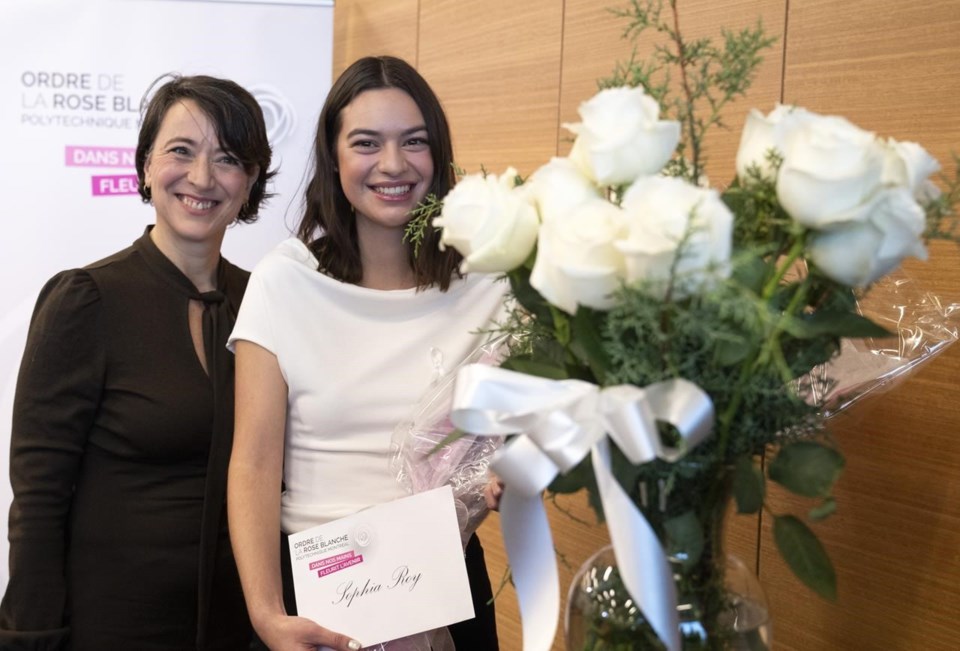MONTREAL — A Quebec environmental engineering student intent on researching solutions to the global climate crisis is the latest recipient of a $30,000 prize established in honour of the 14 women killed 33 years ago at Montreal’s École Polytechnique.
The Montreal engineering school announced Monday that Sophia Roy is this year’s winner of its Order of the White Rose scholarship, which was established in 2014 to commemorate the victims and survivors of the shooting on Dec. 6, 1989.
“I am so honoured to be part of the Order of the White Rose. I will always try to be faithful to the mission and the responsibilities that come with it. It’s really a big day for me,” Roy, 23, said in an interview before the ceremony.
White roses have become the symbol commemorating the victims of the 1989 mass murder committed by a gunman motivated by a hatred of feminists. The flowers, Polytechnique Montréal says, now represent "the blossoming of female interest and talent in the fields of science, technology and engineering."
Nathalie Provost, who was injured in the mass shooting, spoke at the event and said she was pleased that Polytechnique has welcomed Roy to its halls.
“You’re not alone. We are here, and, in my heart, they are all here too," she said, referring to the 14 victims. "You will be part of a community of beautiful dreamers, and you will not be alone since we will be there with you so that tomorrow’s reality lives up to our dreams today."
The scholarship is awarded annually to a female engineering student who wishes to enrol in graduate studies in engineering at any institution of her choosing, in Canada or elsewhere in the world.
Roy’s mother, Nathalie Sioris, began her studies at Polytechnique a year after the shooting, and now her daughter is pursuing an accelerated PhD in chemical and environmental engineering at her alma mater.
‚ÄúMy mother is truly an inspiration to me. She is the one who introduced me to science and engineering. We still talked about her time at Polytechnique. It‚Äôs like coming full circle,‚Äù Roy said.¬Ý
Roy graduated in chemical engineering from McGill University, and Polytechnique said her recent internship at Quebec‚Äôs Department of Environment and Climate Change yielded data instrumental to the province‚Äôs rejection of a proposed multibillion-dollar liquefied natural gas project. She was able to bypass completing a master‚Äôs degree and is studying steel decarbonization methods as part of her PhD.¬Ý
Roy added that mentoring other young women is also a big part of her mission, and she hopes that her story inspires others to pursue their own dreams.
“I would like to eventually become a professor in chemical engineering, then I could have my own laboratory to continue solving problems and also it would allow me to mentor and exchange with the new generation,” said Roy.
Polytechnique president Maud Cohen told the ceremony that since 1989, when women were barely 17 per cent of the student body, the school has made great strides in increasing the number of women engineering students.
“This fall, Polytechnique attained a new milestone," Cohen said. "For the first time, women constitute more than a third of those newly enrolled in the bachelor’s degree — precisely 33.6 per cent." She said the university has already surpassed a national target of having women represent at least 30 per cent of graduates by 2030.
Michèle Prévost, a professor at the engineering school who oversaw the jury selection for the 2022 scholarship, told the crowd that Roy’s selection demonstrates that Polytechnique is committed to identifying sustainable solutions that will respond to the climate crisis in the short term and will benefit both society and the planet.
On Tuesday morning, a number of events are planned to mark the anniversary of the shootings. Polytechnique students and staff will lay rose wreaths at a commemorative plaque on campus. Additionally, at 5:10 p.m. — the time the first shots were fired — 14 beams will illuminate the sky above Mount Royal in memory of the women who lost their lives.
This report by The Canadian Press was first published Dec. 5, 2022.
---Ã˝
This story was produced with the financial assistance of the Meta and Canadian Press þ£ƒÃ…Á«¯ Fellowship.¬Ý
Marisela Amador, The Canadian Press




